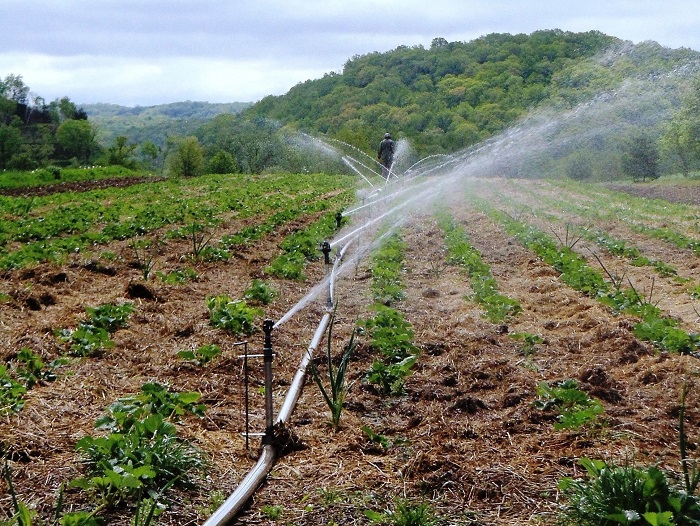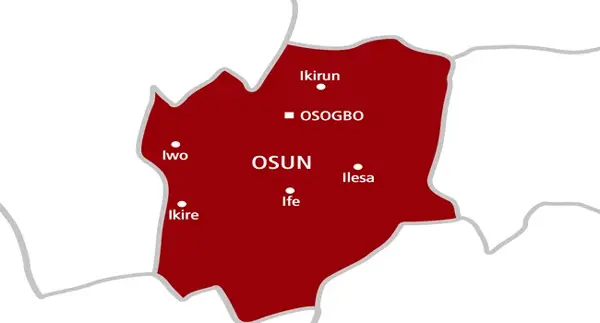As hardship caused by the removal of fuel subsidy bit harder on the livelihood of Pepper Farmers in some part of Osun state.
Speaking with Reporter, Olayiwola Olaide, a 28-year-old pepper farmer in Saloro village, Igbajo, Osun State, the escalating expenses and rollercoastering cost of living cast a dark shadow over his once-promising future.
Now, laborers demand one million naira yearly, an unfathomable sum in a bygone era of economic prosperity – while the once-modest wages that could afford a motorbike are now a distant memory, leaving Olaide to battle for the survival of his business.
“First of all, the fuel we use to power the engine to wet our crops is now costly,” Olaide lamented. His weathered hands betrayed years of toil in the sun-kissed fields.
“The fuel that we used to buy for N4,000 [Four thousand naira] before is now around N19,000 [Nineteen thousand]. That was the fuel that used to fill the keg before, even as last year” Olaide told Reporter.
The once-predictable rhythm of rural life has been disrupted by the relentless march of inflation, leaving Olaide and his fellow pepper producers to navigate treacherous financial waters in thriving their means of livelihood.
“We still do the same quantity of jobs but at a more expensive rate for the labourers, my prayer now is to receive more patronage” Olaide implored.
THE BEGINNING OF HARDSHIP IN NIGERIA
According to the Guardian Newspaper, Bongo Adi, a professor of economics and data analytics at Lagos Business School, expressed that the overall economic progress since 1999 has been hard to measure due to the many periods of growth and decline.
“The economy has moved in different directions over this period,” he said. The best era of economic welfare and sustained employment, however, was in the early 2000s under former president Olusegun Obasanjo, he added.
Unfortunately, the situation has worsened over the past few years. In 2023, Nigerians experienced the bittersweet regulation of fuel subsidy, when the new, still the recent democratic government began its administration.
Voice Air Media recalled on 29th May 2023, at the inauguration of Nigeria’s new president, Bola Ahmed Tinubu, announced the cessation of the fuel subsidy in his inaugural speech.
Throughout 2023, the Nigerian naira underwent a severe devaluation, plummeting by 96.55% against the US dollar in the official exchange market.
By year’s end, the exchange rate had escalated to N907.11 per dollar from N461.61 at the close of 2022, with the naira oscillating between N950 and N1000 in official trades.
The removal of the fuel subsidy, coupled with the naira’s sharp depreciation, has significantly fueled inflation, exerting immense pressure on Nigerian businesses. Companies have been hit with escalating costs for inputs and outputs, leading to widespread operational challenges.
The surge in transportation and production expenses, alongside higher import costs due to the weakened currency, has compelled businesses to rethink their pricing strategies and operational models.
Given that Nigeria’s economy relies heavily on oil, which accounts for nearly 90% of its export earnings, it is highly vulnerable to currency volatility.
As the naira weakens, businesses face intensified inflation, rising production costs, and the threat of job cuts. To curb inflation, the Central Bank resorted to hiking interest rates, which dampened consumer spending and investment.
According to the National Bureau of Statistics (NBS), Nigeria’s inflation has been climbing for 11 consecutive months, reaching its peak in December 2023. This persistent inflation underscores the economic difficulties brought about by the end of the fuel subsidy and the naira’s devaluation.
Businesses are being forced to adapt their pricing and operational tactics to remain viable amid rising inflation.
The depreciating currency has led to heightened inflation, increased production costs, and potential job losses, presenting formidable challenges for the Nigerian economy.
Rising Costs, Squeezed Budgets
Saloro Pepper Farm
Olaide stands tall, his gaze fixed on the horizon, a beacon of hope for his fellow villagers. “We implore the government to help us reduce the cost of fuel,” he appealed, carrying the hopes and dreams of an entire community.
“Even the cost of labor has increased compared to how it was before. What we did for 1 thousand before is now 3 thousand.” He said
Sharing his plight, Afolabi Ojo, also a pepper planter in his late 40s, embodies the resilience of the Nigerian farmer, he said “The high cost of living affects my business in myriad ways.’
His voice carried the weight of years spent tending to the fertile soil of his ancestral land.
“There has been an upward surge in the price of the chemicals that we rely on to safeguard our crops.” He lamented
IMPACTS OF INFLATION ON PEPPER FARMERS
Oladipupo Oladapo, a seasoned pepper planter, stood amidst his sprawling pepper fields, the vibrant green leaves rustling softly in the breeze.
His face, weathered by years of toil under the sun, bore a look of deep concern. As he surveyed the rows of pepper plants, the weight of uncertainty seemed to hang in the air as heavy as the humidity on a midsummer’s day.
“It’s getting harder to keep up,” Oladipupo began, his voice carrying the weight of his worries. “The cost of everything has soared. Tools, seeds, fertilizers – they’ve all become exorbitantly priced. Even the most basic items we need for daily survival, like food, have become a luxury.” He paused, his furrowed brow reflecting the depth of his anxiety.
His hands, calloused and rough from years of working the land, gestured toward the fields, “In the past, we could manage. There was a balance – a harmony between what we produced and what we needed to sustain ourselves. But now, it feels like that balance is slipping away.” His eyes, which once sparkled with the promise of a fruitful harvest, now seemed clouded with doubt.
Oladipupo reminisced about the days when farming was a family tradition, passed down from generation to generation. “I learned everything I know from my father, and his father before him,” he recounted. “Back then, the land was generous. It provided for us in abundance. But today, despite our best efforts, it seems the land is no longer enough. The costs are outpacing the returns.”
As he spoke, Oladipupo’s voice grew softer, tinged with a sense of nostalgia and loss, “There was a time when we celebrated every harvest, no matter how small. It was a time of joy and community. Now, each harvest brings more worry than celebration. Will we have enough to sell? Will we be able to cover our expenses? These questions haunt us every day.”
Despite the challenges, Oladipupo remained resolute in his dedication to farming. “This is all I know. It’s not just a livelihood; it’s a way of life,” he declared. “But something needs to change. We need support – from the government, from the community, from anyone who understands the plight of farmers like me,” Oladipolupo implored.
Another farmer, Lekan Olawuyi’s calloused hands bears silent testimony to the relentless hardships faced by farmers in this part of the country. “The high cost of living has had a profound impact on our livelihoods, the price of chemicals, essential for protecting our crops from pests and disease, has skyrocketed,” Lekan lamented.
The escalating prices of essential farming tools and materials are crippling their ability to sustain their livelihoods. “We’re not just struggling to make a profit anymore; we’re fighting to survive. The cost of seeds, fertilizers, and even the water we need for irrigation has gone through the roof. Many of us have had to take out loans just to keep our farms running, and the debt is becoming unbearable,” Lekan narrated to Reporter.
Similarly, Adewale Johnson, a seasoned farmer with a wealth of experience, his perspective shed light on different aspects of the agricultural struggle.
Adewale Johnson’s face spoke of the years he spent under the relentless African sun. “It’s not just about the rising costs,” Adewale interjected, his tone contemplative. “The climate is changing, and we’re seeing more extreme weather patterns. Droughts and floods are becoming more common, and our traditional farming methods are no longer as effective.”
He paused, wiping the sweat from his brow. “We need more support from the government and access to new technologies that can help us adapt to these changes. Investment in research and development for drought-resistant crops and better irrigation systems could make a huge difference.”
Johnson also pointed out the increasing cost of labor. “Hiring laborers to help with planting and harvesting has become a significant expense. With the prices of necessities going up, we have to pay more to ensure they can sustain their families too.”
“We are the backbone of this country,” Olawuyi stated, determination hardening his features. “If we fall, the entire nation feels the impact. We need immediate intervention to keep our farms alive and productive.”
A Guide
Shedding more light on the consequences, David Ayeni, a Lecturer in the Department of Economics at Adekunle Ajasin University, Akungba-Akoko (AAUA), sheds light on the far-reaching effects of the recent fuel subsidy removal in Nigeria.
According to Ayeni, the decision to remove the subsidy has had significant repercussions on both the economy and the daily lives of Nigerians.
He said, “The argument has been that the fuel subsidy payments may not be sustainable any longer, looking at the economic realities of Nigeria,” Ayeni notes. The government faced increasing difficulty in generating sufficient revenue to cover its expenditures without resorting to excessive borrowing. As a result, removing the subsidy was seen as a necessary step to stabilize the economy.
Ayeni emphasized that the Nigerian economy heavily relies on fuel, impacting virtually all sectors, including agriculture, manufacturing, and services. “What food is to the body, fuel is to the economy. Fuel provides energy to an economy”
“The increased cost of fuel has led to higher production costs, which in turn have contributed to rising prices for goods and services across the board.
“Official reports from the National Bureau of Statistics (NBS) and the Central Bank of Nigeria (CBN) suggest an inflation rate of around 40%, but Ayeni argues that the real impact on essential goods is much higher. “The reality is that inflation in Nigeria is above 100% for most daily consumable products,” he asserted.
ADVICE
In light of these challenges, Ayeni advised the government to implement measures to mitigate the adverse effects of subsidy removal. This could include targeted support for the most affected sectors and exploring alternative energy sources to reduce dependency on fuel. For traders and local producers, he suggests adopting more efficient production methods and diversifying energy sources.
By; Boluwatife Adedokun
Edited; Bright Gbotemi.




